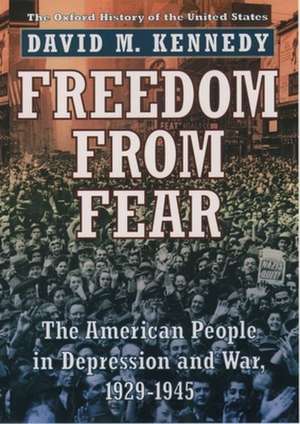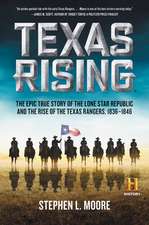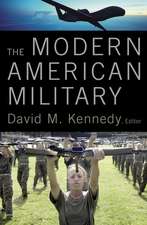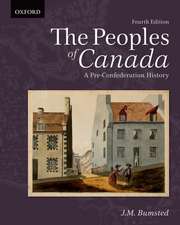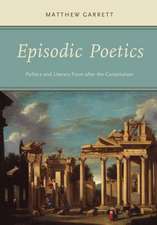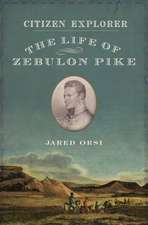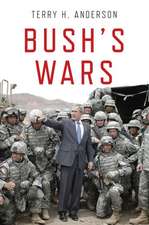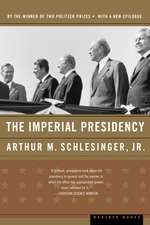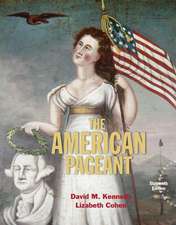Freedom from Fear
Autor David M. Kennedyen Limba Engleză Hardback – 30 apr 1999
Vezi toate premiile Carte premiată
| Toate formatele și edițiile | Preț | Express |
|---|---|---|
| Paperback (1) | 130.45 lei 10-16 zile | +71.53 lei 4-10 zile |
| Oxford University Press – 30 aug 2001 | 130.45 lei 10-16 zile | +71.53 lei 4-10 zile |
| Hardback (1) | 434.64 lei 3-5 săpt. | |
| Oxford University Press – 30 apr 1999 | 434.64 lei 3-5 săpt. |
Preț: 434.64 lei
Nou
Puncte Express: 652
Preț estimativ în valută:
83.19€ • 90.40$ • 69.93£
83.19€ • 90.40$ • 69.93£
Carte disponibilă
Livrare economică 31 martie-14 aprilie
Preluare comenzi: 021 569.72.76
Specificații
ISBN-13: 9780195038347
ISBN-10: 0195038347
Pagini: 990
Dimensiuni: 164 x 241 x 60 mm
Greutate: 1.53 kg
Editura: Oxford University Press
Locul publicării:New York, NY
ISBN-10: 0195038347
Pagini: 990
Dimensiuni: 164 x 241 x 60 mm
Greutate: 1.53 kg
Editura: Oxford University Press
Locul publicării:New York, NY
Recenzii
"An engrossing narrative of a momentous time. The best one-volume account of the Roosevelt era currently available.... Good old-fashioned history."--Barry Gewen, The New York Times Book Review
"This is modern America's story--modern America's most thrilling, most irresistible, and most significant story--and in this massive volume, David M. Kennedy makes it his story in a way that no one has before. Freedom From Fear, the fourth installment of the new Oxford History of the United States
to appear, is as much a triumph as its predecessors, providing every indication that the series, once completed, will stand as the most comprehensive and most compelling narrative history of the nation."--David M. Shribman, Boston Globe
"A grand historical synthesis.... This is the kind of book prizes are made for."--Herbert Mitgang, Chicago Tribune
"Rarely does a work of historical synthesis combine such trenchant analysis and elegant writing as does Kennedy's spectacular contribution to the Oxford History of the United States.... Will stand for years to come as the definitive history of the most important decades of the American
century."--Publishers Weekly
"No other book so vividly captures the spirit of those 17 years that forever changed America."--Richard A. Nenneman, Christian Science Monitor
"An engrossing narrative of a momentous time. The best one-volume account of the Roosevelt era currently available.... Good old-fashioned history."--Barry Gewen, The New York Times Book Review
"This is modern America's story--modern America's most thrilling, most irresistible, and most significant story--and in this massive volume, David M. Kennedy makes it his story in a way that no one has before. Freedom From Fear, the fourth installment of the new Oxford History of the United States to appear, is as much a triumph as its predecessors, providing every indication that the series, once completed, will stand as the most comprehensive and most compelling narrative history of the nation."--David M. Shribman, Boston Globe
"A grand historical synthesis.... This is the kind of book prizes are made for."--Herbert Mitgang, Chicago Tribune
"Rarely does a work of historical synthesis combine such trenchant analysis and elegant writing as does Kennedy's spectacular contribution to t
"A grand historical synthesis...this is the kind of book prizes are made for."--Chicago Tribune
"This is modern America's story--modern America's most thrilling, most irresistible, and most significant story--and in this massive volume, David M. Kennedy makes it his story in a way that no one has before. Freedom From Fear, the fourth installment of the new Oxford History of the United States to appear, is as much a triumph as its predecessors, providing every indication that the series, once completed, will stand as the most comprehensive and most compelling narrative history of the nation." --Boston Globe
"Rarely does a work of historical synthesis combine such trenchant analysis and elegant writing as does Kennedy's spectacular contribution to the Oxford History of the United States. Kennedy uses a wide canvas to depict all aspects of the American political, social and economic experience from 1929 to 1945. He also provides a stunningly original reinterpretation of the competing forces and interests that combined to shape the New Deal under FDR's direction. The book's final 400 pages admirably demonstrate exactly how the U.S. emerged victorious in WWII.... Because of its scope, its insight and its purring narrative engine, Kennedy's book will stand for years to come as the definitive history of the most important decades of the American Century." --Publishers Weekly
"An engrossing narrative of a momentous time. The best one-volume account of the Roosevelt era currently available.... Good old-fashioned history."-- The New York Times Book Review
"An indispensable account of the two great formative events of 20th century American history--the Great Depression and the second World War."--The Economist
"The book...has my strong approval. As it will have, I cannot doubt, that of the many readers it deserves."--John C. Gilbraith, The Washington Monthly
"An invaluable compendium of the hyperactive period that contains the Great depr
"This is modern America's story--modern America's most thrilling, most irresistible, and most significant story--and in this massive volume, David M. Kennedy makes it his story in a way that no one has before. Freedom From Fear, the fourth installment of the new Oxford History of the United States
to appear, is as much a triumph as its predecessors, providing every indication that the series, once completed, will stand as the most comprehensive and most compelling narrative history of the nation."--David M. Shribman, Boston Globe
"A grand historical synthesis.... This is the kind of book prizes are made for."--Herbert Mitgang, Chicago Tribune
"Rarely does a work of historical synthesis combine such trenchant analysis and elegant writing as does Kennedy's spectacular contribution to the Oxford History of the United States.... Will stand for years to come as the definitive history of the most important decades of the American
century."--Publishers Weekly
"No other book so vividly captures the spirit of those 17 years that forever changed America."--Richard A. Nenneman, Christian Science Monitor
"An engrossing narrative of a momentous time. The best one-volume account of the Roosevelt era currently available.... Good old-fashioned history."--Barry Gewen, The New York Times Book Review
"This is modern America's story--modern America's most thrilling, most irresistible, and most significant story--and in this massive volume, David M. Kennedy makes it his story in a way that no one has before. Freedom From Fear, the fourth installment of the new Oxford History of the United States to appear, is as much a triumph as its predecessors, providing every indication that the series, once completed, will stand as the most comprehensive and most compelling narrative history of the nation."--David M. Shribman, Boston Globe
"A grand historical synthesis.... This is the kind of book prizes are made for."--Herbert Mitgang, Chicago Tribune
"Rarely does a work of historical synthesis combine such trenchant analysis and elegant writing as does Kennedy's spectacular contribution to t
"A grand historical synthesis...this is the kind of book prizes are made for."--Chicago Tribune
"This is modern America's story--modern America's most thrilling, most irresistible, and most significant story--and in this massive volume, David M. Kennedy makes it his story in a way that no one has before. Freedom From Fear, the fourth installment of the new Oxford History of the United States to appear, is as much a triumph as its predecessors, providing every indication that the series, once completed, will stand as the most comprehensive and most compelling narrative history of the nation." --Boston Globe
"Rarely does a work of historical synthesis combine such trenchant analysis and elegant writing as does Kennedy's spectacular contribution to the Oxford History of the United States. Kennedy uses a wide canvas to depict all aspects of the American political, social and economic experience from 1929 to 1945. He also provides a stunningly original reinterpretation of the competing forces and interests that combined to shape the New Deal under FDR's direction. The book's final 400 pages admirably demonstrate exactly how the U.S. emerged victorious in WWII.... Because of its scope, its insight and its purring narrative engine, Kennedy's book will stand for years to come as the definitive history of the most important decades of the American Century." --Publishers Weekly
"An engrossing narrative of a momentous time. The best one-volume account of the Roosevelt era currently available.... Good old-fashioned history."-- The New York Times Book Review
"An indispensable account of the two great formative events of 20th century American history--the Great Depression and the second World War."--The Economist
"The book...has my strong approval. As it will have, I cannot doubt, that of the many readers it deserves."--John C. Gilbraith, The Washington Monthly
"An invaluable compendium of the hyperactive period that contains the Great depr
Descriere
Between 1929 and 1945, two great travails were visited upon the American people: the Great Depression and World War II. Freedom From Fear tells the story of how Americans endured, and eventually prevailed, in the face of those unprecedented calamities.
The Depression was both a disaster and an opportunity. As David Kennedy vividly demonstrates, the economic crisis of the 1930s was far more than a simple reaction to the alleged excesses of the 1920s. For more than a century before 1929, America's unbridled industrial revolution had gyrated through repeated boom and bust cycles, wastefully consuming capital and inflicting untold misery on city and countryside alike. Nor was the fabled prosperity of the 1920s as uniformly shared as legend portrays. Countless Americans, especially if they were farmers, African Americans, or recent immigrants, eked out thread bare lives on the margins of national life. For them, the Depression was but another of the ordeals of fear and insecurity with which they were sadly familiar.
Franklin Roosevelt's New Deal wrung from the trauma of the 1930s a lasting legacy of economic and social reform, including the Social Security Act, new banking and financial laws, regulatory legislation, and new opportunities for organized labor. Taken together, those reforms gave a measure of security to millions of Americans who had never had much of it, and with it a fresh sense of having a stake in their country.
Freedom From Fear tells the story of the New Deal's achievements, without slighting its shortcomings, contradictions, and failures. It is a story rich in drama and peopled with unforgettable personalities, including the incandescent but enigmatic figure of Roosevelt himself.
Even as the New Deal was coping with the Depression, a still more fearsome menace was developing abroad--Hitler's thirst for war in Europe, coupled with the imperial ambitions of Japan in Asia. The same generation of Americans who battled the Depression eventually had to shoulder arms in another conflict that wreaked world wide destruction, ushered in the nuclear age, and forever changed their own way of life and their country's relationship to the rest of the world. Freedom From Fear explains how the nation agonized over its role in World War II, how it fought the war, why the United States won, and why the consequences of victory were sometimes sweet, sometimes ironic. In a compelling narrative, Kennedy analyzes the determinants of American strategy, the painful choices faced by commanders and statesmen, and the agonies inflicted on the millions of ordinary Americans who were compelled to swallow their fears and face battle as best they could.
Freedom From Fear is a comprehensive and colorful account of the most convulsive period in American history, excepting only the Civil War--a period that formed the crucible in which modern America was formed.
The Oxford History of the United States
The Atlantic Monthly has praised The Oxford History of the United States as "the most distinguished series in American historical scholarship," a series that "synthesizes a generation's worth of historical inquiry and knowledge into one literally state-of-the-art book. Who touches these books touches a profession."
Conceived under the general editorship of one of the leading American historians of our time, C. Vann Woodward, The Oxford History of the United States blends social, political, economic, cultural, diplomatic, and military history into coherent and vividly written narrative. Previous volumes are Robert Middlekauff's The Glorious Cause: The American Revolution; James M. McPherson's Battle Cry of Freedom: The Civil War Era (which won a Pulitzer Prize and was a New York Times Best Seller); and James T. Patterson's Grand Expectations: The United States 1945-1974 (which won a Bancroft Prize).
The Depression was both a disaster and an opportunity. As David Kennedy vividly demonstrates, the economic crisis of the 1930s was far more than a simple reaction to the alleged excesses of the 1920s. For more than a century before 1929, America's unbridled industrial revolution had gyrated through repeated boom and bust cycles, wastefully consuming capital and inflicting untold misery on city and countryside alike. Nor was the fabled prosperity of the 1920s as uniformly shared as legend portrays. Countless Americans, especially if they were farmers, African Americans, or recent immigrants, eked out thread bare lives on the margins of national life. For them, the Depression was but another of the ordeals of fear and insecurity with which they were sadly familiar.
Franklin Roosevelt's New Deal wrung from the trauma of the 1930s a lasting legacy of economic and social reform, including the Social Security Act, new banking and financial laws, regulatory legislation, and new opportunities for organized labor. Taken together, those reforms gave a measure of security to millions of Americans who had never had much of it, and with it a fresh sense of having a stake in their country.
Freedom From Fear tells the story of the New Deal's achievements, without slighting its shortcomings, contradictions, and failures. It is a story rich in drama and peopled with unforgettable personalities, including the incandescent but enigmatic figure of Roosevelt himself.
Even as the New Deal was coping with the Depression, a still more fearsome menace was developing abroad--Hitler's thirst for war in Europe, coupled with the imperial ambitions of Japan in Asia. The same generation of Americans who battled the Depression eventually had to shoulder arms in another conflict that wreaked world wide destruction, ushered in the nuclear age, and forever changed their own way of life and their country's relationship to the rest of the world. Freedom From Fear explains how the nation agonized over its role in World War II, how it fought the war, why the United States won, and why the consequences of victory were sometimes sweet, sometimes ironic. In a compelling narrative, Kennedy analyzes the determinants of American strategy, the painful choices faced by commanders and statesmen, and the agonies inflicted on the millions of ordinary Americans who were compelled to swallow their fears and face battle as best they could.
Freedom From Fear is a comprehensive and colorful account of the most convulsive period in American history, excepting only the Civil War--a period that formed the crucible in which modern America was formed.
The Oxford History of the United States
The Atlantic Monthly has praised The Oxford History of the United States as "the most distinguished series in American historical scholarship," a series that "synthesizes a generation's worth of historical inquiry and knowledge into one literally state-of-the-art book. Who touches these books touches a profession."
Conceived under the general editorship of one of the leading American historians of our time, C. Vann Woodward, The Oxford History of the United States blends social, political, economic, cultural, diplomatic, and military history into coherent and vividly written narrative. Previous volumes are Robert Middlekauff's The Glorious Cause: The American Revolution; James M. McPherson's Battle Cry of Freedom: The Civil War Era (which won a Pulitzer Prize and was a New York Times Best Seller); and James T. Patterson's Grand Expectations: The United States 1945-1974 (which won a Bancroft Prize).
Notă biografică
Premii
- Pulitzer Prize Winner, 2000
- L.A. Times Book Prize Nominee, 1999
- Ambassador Book Awards Winner, 2000
